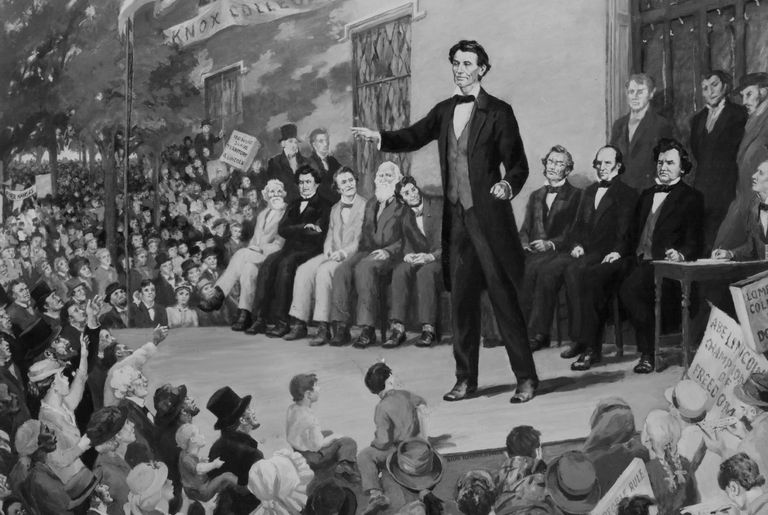Aberdeen, SD. Sen. Marco Rubio has initiated a discussion concerning what he calls “common good capitalism.” Rubio and Sen. Josh Hawley are conservative politicians following the lead of academics such as Patrick Deneen and Adrian Vermeule and popular commentators such as Tucker Carlson in rethinking free market orthodoxy. Rubio is especially influenced by Catholic social thought. Rubio cites Pope Leo XIII and the 1891 encyclical Rerum Novarum as inspiration for “common good capitalism.” That encyclical inspired a “third-way” economic movement, distributism, which thrived in early twentieth-century Catholic circles, most notably with figures such as Hilaire Belloc and G.K. Chesterton.
As I argue at length in my book on Lincoln’s statesmanship, one need not step outside of the American tradition to find support for common good capitalism, and support comes from what many will find a surprising source. Abraham Lincoln, in his defense of free labor, defended a vision of economic justice that placed the dignity of labor and maintenance of a vigorous free society above the desire for profit. There is remarkable similarity between Lincoln’s defense of free labor and Catholic social thought. Those concerned with creating a more just economic order have much to learn from Lincoln’s economic principles.
Distributism and Catholic Social Thought
To ground this discussion, let us first consider some fundamentals of Catholic teaching on economics. I do not wish equate Catholic social thought with distributist economic theory, but distributism gives a useful window into the core commitments of Catholic thought.
Distributists critiqued the capitalism of their day. Belloc writes that under capitalism people are politically free but divided between capitalist and proletarian. Only a “small minority” own capital. The centralization of economic power in this minority leads to injustice. While the relations between laborer and capitalist appear free, in reality the unequal power relationship generates injustice. Leo XIII, in describing the industrialism of the late nineteenth century, observes that “working men have been surrendered, isolated and helpless, to the hardheartedness of employers and the greed of unchecked competition.” The pope warns against “the greed of possession and the thirst for pleasure–twin plagues, which too often make a man who is void of self-restraint miserable in the midst of abundance.” He says of laborers that “grasping employers too often treat them with great inhumanity and hardly care for them outside the profit their labor brings.”
This is a harsh critique of unfettered capitalism. But socialism fares no better under the skeptical eye of the distributist. Belloc argues that while socialism theoretically puts property in the hands of “none,” in practice it “means to vest it as a trust in the hands of political officers.” Socialism puts the lives of workers in the hands of the political class of bureaucrats and politicians. The worker still does not own his labor.
Distributists, like free-market capitalists, defended private property. Arthur Penty argued, “[W]ithout private property there can be no economic freedom, initiative, or sense of personal responsibility.” Socialism is unjust because the state controls property instead of putting it in workers’ hands. Chesterton believed that while the “collectivists” will claim to use property in the name of the people, in fact they will inevitably use property in favor of the elite and well-connected. It is the defense of private property that is at the heart of Leo’s critique of socialism: “Hence, it is clear that the main tenet of socialism, community of goods, must be utterly rejected, since it only injures those whom it would seem meant to benefit, is directly contrary to the natural rights of mankind, and would introduce confusion and disorder into the commonweal. The first and most fundamental principle, therefore, if one would undertake to alleviate the condition of the masses, must be the inviolability of private property.”
What do the distributists offer as an alternative? As the name suggests, they favored a wide distribution of capital amongst the laboring class. Belloc states, “[T]o control the production of wealth is to control human life itself. To refuse man the opportunity for the production of wealth is to refuse him the opportunity for life.” Leo echoes this notion when he calls for property to be “more equitably divided.” He writes, “If working people can be encouraged to look forward to obtaining a share in the land, the consequence will be that the gulf between vast wealth and sheer poverty will be bridged over, and the respective classes will be brought nearer to one another.”
At the center of the distributist enterprise is the family, a focus of Rubio’s common good capitalism. “It is a most sacred law of nature,” writes Pope Leo, “that a father should provide food and all necessaries for those whom he has begotten.” For Leo the aforementioned right to property derives from the family’s right to provide for itself. Further, “inasmuch as the domestic household is antecedent, as well in idea as in fact, to the gathering of men into a community, the family must necessarily have rights and duties which are prior to those of the community, and founded more immediately in nature.” Thus in provisioning society, private associations should be used before the state, “especially as circumstances, times, and localities differ so widely, it is advisable that recourse be had to societies or boards…or to some other mode of safeguarding the interests of the wage-earners.” This is the concept of subsidiarity. In Anthony Esolen’s words, “Leo has in mind a society wherein the rich man and the poor man are friends; they live near one another; they celebrate at the same festivals; they kneel beside one another in church; they know one another’s children.”
Distributists envision a society of many Burkean economic platoons. Ownership in economic enterprises is widely dispersed, with the small proprietor being the basic economic unit of society. Another way of achieving distributist principles is through employee ownership of business. Distributism starts from the assumption that the fundamental unit of society is the family, and the sanctity of that unit must be protected under any economic system. The best way to protect that sanctity is by giving each laborer ownership in some form of property or capital.
I do not wish to present a brief for distributism, which is subject to many valid criticisms. I do wish to describe the tradition from which Rubio and others are drawing. The central point is that an economy has a purpose beyond simply maximizing wealth creation. A just economic system is one focused on the good of the worker rather than merely growing the GDP. The human person is a citizen, a community member, and especially a family member. An economic system that creates wealth yet fails to properly care for these other aspects of the human person is to that extent deficient. Abraham Lincoln would agree.
Independent of Crown-Kings, Money-Kings, and Land-Kings
As a young man, Lincoln read deeply in political economy. His economic education convinced him that economics was as much a moral science as it was a science of efficiency or wealth creation. At the heart of Lincoln’s economic teaching is the concept of free labor. Lincoln most thoroughly discusses his notion of labor in his “Address Before the Wisconsin State Agricultural Society,” presented in 1859. In this lecture Lincoln lays out the distinctions between the “mud-sill” theory of labor articulated by South Carolina Senator James Henry Hammond and the theory of “free labor” advocated by Lincoln. “The world is agreed,” he says, “that labor is the source from which human wants are mainly supplied.” Lincoln declares, “By some it is assumed that labor is available only in connection with capital—that nobody labors, unless somebody else, owning capital, somehow, by use of that capital, induces him to work.” There is a class of men, some argue, who serve as a permanent laboring class unable to improve its condition. It serves as a “mud-sill” of society, a kind of permanent underclass.
In contrast, Lincoln defines free laborers as a class of men who do not have their labor possessed by someone else. Lincoln states, “[T]here is no such thing as a freeman being fatally fixed for life in the condition of a hired laborer.” The man who labors at first for wages can one day own his own property and, more importantly, his own labor. “It is not forgotten,” says Lincoln, “that a considerable number of persons mingle their own labor with capital.” In his 1861 Annual Message, Lincoln states most people of his time are neither purely capitalists nor purely laborers. Because they own their own labor while working their own field or in their own shop, they partake of both roles. “Men with their families—wives, sons, and daughters—work for themselves, on their farms, in their houses, and in their shops, taking the whole product to themselves, and asking no favors of capital on the one hand, nor of hired laborers or slaves on the other.”
Perhaps thinking of his own employment history, Lincoln in Wisconsin suggests, “Many independent men, in this assembly, doubtless, a few years ago were hired laborers. And their case is almost, if not quite, the general rule. The prudent, penniless beginner in the world labors for wages awhile, saves a surplus with which to buy tools or land for himself.” Lincoln concludes, “This, says its advocates, is free labor— the just and generous, and prosperous system, which opens the way for all —gives hope to all, and energy and progress and improvement of the condition of all.”
Lincoln, to be sure, saw wage labor as superior to that of slave labor. Lincoln was convinced that working for a wage provides valuable experience that allows the laborer to improve his condition in life. Still, for Lincoln, wage labor is an intermediate stage that often occurs before actual free labor. Wage labor is not free labor.
Lincoln believed that education was fundamental to creating a free labor system. The advocates of the mud-sill theory believe that there is a permanent laboring class that cannot better itself, so there is no reason to educate that class. This echoes the arguments on many college campuses today that we need not ground our students in the humanities as the task of the university is merely job preparation. Lincoln argues, “According to [the mud-sill] theory, a blind horse upon a treadmill is a perfect illustration of what a laborer should be—all the better for being blind, that he can not tread out of place, or kick understandingly.” The model mud-sill worker is Orwell’s Boxer the horse, repeatedly affirming, “I will work harder.” The laborer, from this perspective, is dehumanized and turned into a mere cog in the wheel, or what we might now call a “human resource,” little different than a draft horse or a lump of coal.
Lincoln held that education allows humans to gain efficiency, to produce more goods with fewer resources. He believed that “in a world less inclined to wars, and more devoted to the arts of peace” population greatly increases. Before long “the most valuable of all arts, will be the art of deriving a comfortable subsistence from the smallest area of soil.” This kind of self-sufficiency is a bulwark against despotism. Lincoln declares, “No community whose every member possesses this art, can ever be the victim of oppression in any of its forms. Such community will be alike independent of crowned-kings, money-kings, and land-kings.”
Lincoln’s concept of freedom is more subtle than that of free market purists. While Lincoln did not believe in any “law to prevent a man from getting rich,” he has deeper commitments than economic efficiency or wealth production. This is how he contrasts free labor with slavery. Even if slavery were economically superior, it is inconsistent with human dignity. For Lincoln, economics is a both a private and a common good.
There is evidence that Lincoln would have been uncomfortable with the centralization of economic power that typified the Industrial Revolution that accelerated in the decades after his untimely death. The American Whig tradition from which Lincoln arose was itself anxious about mass industrialization. Daniel Walker Howe argues Whig industrialists wished to avoid the “grotesque urban sprawl” of English industrial cities. Lincoln and Whigs were influenced by the economic writings of Henry C. Carey. Howe says of Carey, “Carey’s ideal was neither an arcadia of yeoman farmers nor a big city but a ‘middle-state’ between rural and urban life.” Carey had an antipathy toward the impersonal metropolis and preferred self-employment over wage labor. “Though Carey and the Whigs favored industrialization,” writes Howe, “they were not generally enthusiastic about large-scale urbanization.” Unlike Lincoln, Carey survived the Civil War and lived to see the arrival of mass industrial capitalism. At the end of his life, Carey concluded that the form of capitalism evolving within the Industrial Revolution was not consistent with his philosophy. Carey blanched at the Gilded Age worship of efficiency and wealth at the expense of more humane concerns. Howe explicitly links Carey’s philosophy to Lincoln. Lincoln advocated for “a society of small entrepreneurs, market-oriented farmers, young men working for others until they could save enough to set up for themselves, and striving professionals like himself.” Howe concludes, “Within a generation after his death, the kind of society Lincoln loved was being superseded by urban-industrial capitalism, and nowhere faster than in his own state of Illinois. Henry C. Carey was horrified when he saw the new economy, and we may believe that Lincoln, too, would have been grieved by its oppression and sordid materialism.”
Lincoln and Common Good Capitalism
As in Catholic social thought and Marco Rubio’s “common good capitalism,” Lincoln is teaching us that material comfort is a limited good, not to be pursued to the point of losing ordered liberty. One need not support every economic prescription of the distributists or Lincoln. Each, however, presents certain principles that we can use to orient our economic thinking in the era of global capitalism. One aspect of such an orientation is the dignity of work and the duty to maximize laborers’ control over their own economic destiny. It is difficult to imagine Lincoln supporting an economy that sustains large GDP growth and copious consumption yet leaves people unable to pursue the meaningful work that is one facet of a free life. An economic vision that has material wealth as a sole criterion for success is akin to a political theory that sees majority rule as the only political good. A virtuous statesman does not simply desire the material well-being of the people, however good that is, but balances the very human desire for material comfort with the more noble ends of a free and democratic people. Lincoln’s political economy said that material well-being is good, but not as good as being independent of crowned-kings, money-kings, and land-kings.





3 comments
Hans Noeldner
How do you propose to reach distributism from present conditions, where the means of production are not only highly concentrated in the hands of a few, but which are often located in other nations?
Nick R.
So Lincoln himself believed that free labor was better than wage labor, but most of his quotes in this article seem to portray the individual as responsible for pursuing a life of free labor.
I am left wondering whether Lincoln was actually in favor of using the coercive power of the state to enforce his vision of free labor. It’s one thing to hold an ideal; it’s another thing to make the state responsible for its realization.
I can think of one quote which offers some insight into this question, though only vague insight. He once said that the purpose of the American form of government is to “clear the obstacles from the pathways of all, to open the avenues of honorable employment to all, and to give to all an unfettered start and a fair chance in the race of life.”
I suppose the whole question depends on his definition of “obstacles,” “unfettered,” and “fair chance.” As for me, I’m unsure whether the average laborer today needs any help from the state in his pursuit of free labor. No one ever said that the attainment of free labor was supposed to be easy; only that it should be possible.
New England Jon
Thank you, professor. Thomas DiLorenzo won’t read this article, but he should. It pokes holes in his theory that Lincoln was the Great Centralizer.
Comments are closed.